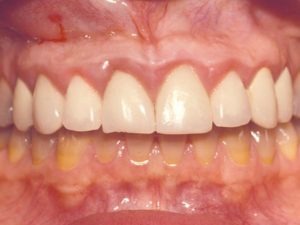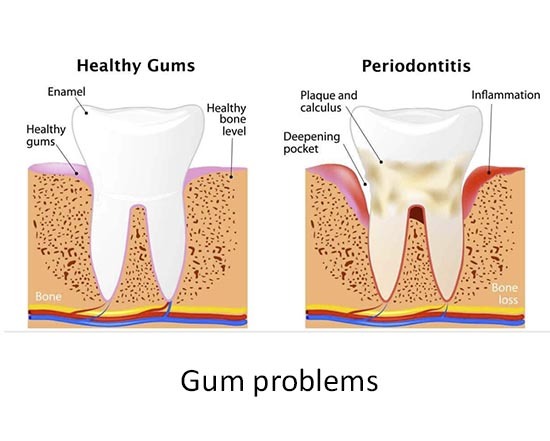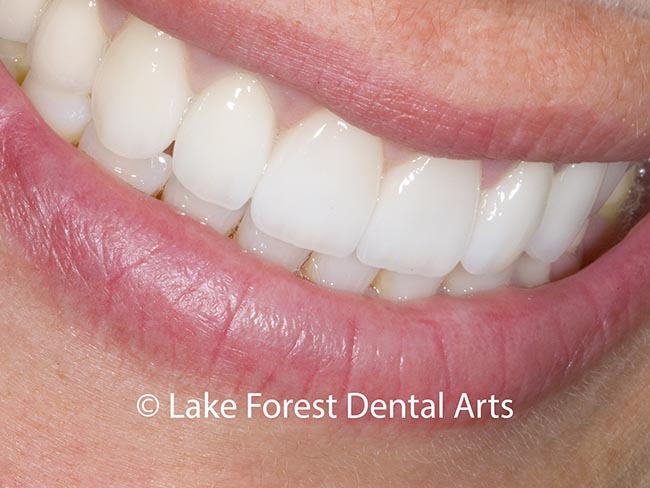
A gum problem (periodontal disease) is a chronic infection of the gums. It is caused by bacterial plaque that accumulates on teeth and destroys the gums. Plaque can accumulate on teeth if proper oral hygiene habits are not observed, although some people are simply more prone to plaque buildup than others. Various medications and health conditions also contribute to the development of periodontal problems.
Periodontal issues become evident when deeper pockets form at the gum line. These pockets occur when bacteria eat away at the bond between teeth and gums. In those pockets, bacteria breed and thrive, ultimately creating bigger and deeper pockets. Over time, periodontal disease can destroy the bone that holds a tooth in place. When gum and bone degenerate, a tooth can loosen or fall out. Eighty percent of Americans have some sort of periodontal disease. Gum disease is a leading cause of tooth loss in this country.
How does plaque cause gum problems?
Gum disease results from the interaction between plaque, bacteria, and food particles. Plaque is a thin, clear film that continually develops on the surface of your teeth. Plaque provides a home for bacteria to live and feed. Over time, plaque calcifies into a hard substance known as tartar. It can only be removed from the gums and teeth with professional dental cleanings. Ignored tartar buildup increases the risk of developing problems. Elderly patients tend to be on medications that can cause a dry mouth. More buildup occurs when there is less saliva.
As the bacteria in plaque consume sugars in your mouth, the microorganisms release acid that weakens and eventually erodes enamel. The acids also break down the attachment between the gum and the tooth. This is the beginning of gingivitis and periodontitis. As the gum tissue peels away, the gums recede and the pockets get deeper. Once this process of erosion begins, it can only be stopped with professional treatments from a qualified dentist.

Signs indicating periodontal disease
During your examination your dentist will inquire into your medical history while examining your mouth for gum disease. Things that increase the risk for gum problems include:
- Tobacco use
- Advanced age
- A sugary diet
- Poor oral hygiene habits
- Crowded teeth
- Certain medical conditions
Common warning signs of gum problems include:
- Gum inflammation
- Menstruation gingivitis
- Bleeding with brushing or flossing
- Red, swollen, or tender gums
- Receding gums
- Persistent bad breath
- Soft tissue and bone loss
Treatment options for gum problems

Veneers were placed on this smile and after treatment, this tissue was very healthy pink.
The disease has been linked to health problems such as heart disease, diabetes, cancer, Alzheimer’s disease, and stroke. We believe in supporting optimal oral health and overall health through preventative care and state of the art treatment. At your six-month checkups and cleanings, we’ll look for signs of periodontal disease and help you take measures to prevent or reverse the condition. Should you already have gum problems, we’ll recommend appropriate treatment, which may involve:
Scaling and root planing:
Deep cleanings offer a safe and effective means of treating more advanced levels of chronic periodontitis. The restorative treatment is completed through two straightforward steps: scaling and root planing. Before your treatment begins, Dr. Fondriest or a member of our dental team will apply a topical anesthetic to your gums. Once you are comfortable, a special metal tool will be used to remove tartar buildup on your teeth. Then, your tooth roots will be smoothed through a process called root planing. Antibiotics may be applied to your gums. Most patients experience no complications or side effects following this straightforward procedure.
Antibiotic therapy for gum problems:
Antibiotics can play an important role in treating gum issues. If you have moderate to advanced levels of gum problems, you may be prescribed antibiotics to help fight the plaque infection.
Dental cleanings:
Good oral hygiene and twice a year dental cleanings can prevent the return of gum problems. The American Dental Association recommends professional cleanings to treat mild forms of periodontal disease. During your treatment, one of our dental hygienists will remove deposits of plaque and tartar from your teeth before polishing your teeth using a rotary device.
Surgery:
Advanced levels of gum disease may require oral surgery to restore oral health and to re-contour the gum to restore symmetry.
What Can You Do To Protect Your Smile At Home?
Regular dental cleanings are essential to protecting your smile. There are also ways you can protect your teeth and gums at home. In fact, there are several surprisingly simple home remedies and habits that can help to remove plaque.
- Since plaque on and around the teeth can lead to irritation of the gums, it’s important to brush your teeth properly, at least two times a day. Brushing should involve a pea sized amount of fluoridated toothpaste, circular motions, and should last two minutes each time.
- Of course, flossing is also important to protecting one’s gums. Make sure you are using enough floss to gently move a clean strip of floss between each of your teeth.
- What you eat and drink will also impact your oral health. To keep your smile healthy, you should be drinking water throughout the day, and avoid lots of sugar. Sugar allows the bacteria in the mouth to feed upon it, leading to increased potential for gingivitis.
- Regular dental cleanings can help remove tartar, but if you are already suffering symptoms of a dental issue, like gingivitis you may find that a deeper cleaning, like gum disease treatment, is in order, to help rid your mouth of further bacteria.
- Gums that are visibly inflamed or irritated are unhealthy and have a reduced ability to fight infection. The bacteria that causes gingivitis produce Interleukin 10 which reduces your immune response to gum bacteria.
Can I get dental implants if I have gum disease?
A frequent questions we receive is, “can I get implants with gum disease?” Loss of the bone that held the teeth presents problems in the future. The bone is needed to hold dental implants that can be used to replace your lost teeth. Surgeons use CT scans to determine if there is enough bone to do implants.
Implants can have gingivitis or periodontitis also. The American Academy of Periodontology calls it peri-implantitis. Treatment is very similar to that for natural teeth.
Gum problems affect your oral health and your overall health
Gum issues have been linked to systemic diseases such as heart disease, diabetes, Alzheimer’s disease, and stroke. At your six month checkups and cleanings, we’ll look for signs of periodontal disease and help you take measures to prevent or reverse the condition. If you have periodontal problems, we’ll recommend appropriate treatments.
If you experience any of these symptoms of periodontal disease, contact our Chicago area dentist office at 847.234.0517 to schedule an appointment with Dr. James Fondriest. He is renowned for creating healthy mouths and placing natural-looking dentistry.
